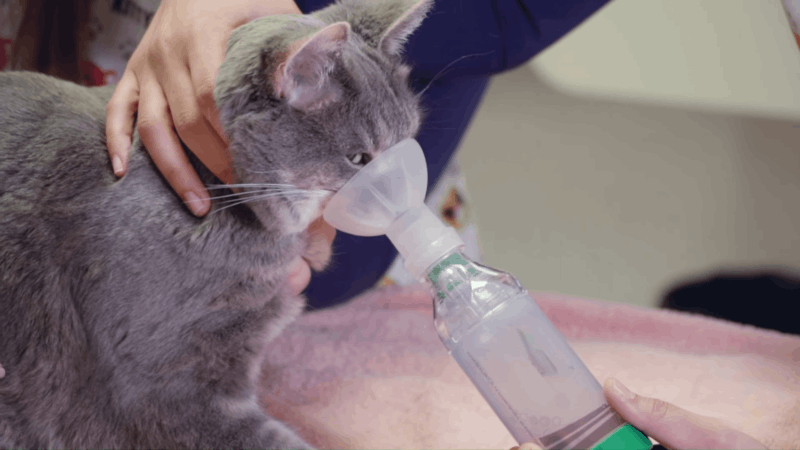No products in the cart.
CBD for asthma in cats is a topic of growing interest as cat owners explore alternative treatment options to alleviate their feline companions’ respiratory symptoms. Like human asthma, feline asthma is a chronic illness marked by inflammation and restriction of the airways.
In this blog, we will explore CBD for asthma in cats, can cats have asthma, does CBD help asthma, and how CBD can relieve asthma. You can find more amazing CBD products for your pets at Pet CBD Club.
What Is CBD for Asthma in Cats?
The term CBD (cannabidiol) for asthma in cats refers to the use of CBD as a possible all-natural treatment to control the symptoms of feline asthma. Non-psychoactive CBD is a cannabis plant-derived substance. It has attracted attention due to its potential anti-inflammatory properties. Some cat owners have reported using CBD products to help alleviate their cat’s asthma symptoms, although scientific research in this area is limited.

Definition of Feline Asthma
Feline asthma is a chronic respiratory condition that affects cats. It is characterized by inflammation and constriction of the airways, similar to human asthma. Cats with asthma frequently have coughing, wheezing, trouble breathing, and fast breathing episodes. The severity of these symptoms might vary, and they can be brought on by allergens, stress, physical activity, or other environmental variables.
Common Symptoms of Asthma in Cats
- Coughing: Cats with asthma may have persistent or intermittent coughing.
- Wheezing: High-pitched whistling sounds known as wheezing might happen when breathing.
- Difficulty breathing: Cats may show signs of labored or rapid breathing, and they may use their abdominal muscles to help with breathing.
- Open-mouth breathing: In severe cases, cats may breathe with their mouths open.
- Lethargy: Cats with asthma may appear tired or have reduced activity levels.
- Reduced appetite: Some cats with asthma may experience a decreased appetite.
Causes of Asthma in Cats
The precise origins of asthma in cats are not completely understood. It is thought to result from a synergistic interaction between hereditary and environmental variables. Common triggers for asthma attacks in cats include:
- Allergens: Dust mites, pollen, mold spores, and certain types of litter can trigger asthma in susceptible cats.
- Irritants: Environmental irritants such as cigarette smoke, strong odors, or household chemicals can contribute to asthma symptoms.
- Stress: Stressful situations or changes in the cat’s environment can trigger or exacerbate asthma symptoms.
Can Cats Have Asthma?
Yes, cats can develop asthma. Cats of all ages and breeds can get feline asthma, a respiratory ailment that is relatively prevalent. Asthma affects 1–5% of cats, which makes it a serious health issue for our feline friends.

How to Diagnose Asthma in Cats
Asthma in cats can be difficult to diagnose since its symptoms might match those of other respiratory diseases. A veterinarian should be consulted for a proper diagnosis if you believe your cat has asthma. The diagnostic process for feline asthma may include:
- Physical examination: The veterinarian will examine your cat’s overall health and listen for any abnormal lung sounds.
- Diagnostic tests: The veterinarian may advise performing diagnostic procedures, including X-rays, blood tests, or bronchoalveolar lavage (BAL), to examine the respiratory system, weed out other possible causes, and gauge airway inflammation.
Preventing Asthma in Cats
There are steps you can take to lower the risk and lessen the frequency of asthma attacks in cats, although it may not always be possible to completely prevent feline asthma.
- Minimize exposure to triggers: Identify and reduce your cat’s exposure to common allergens such as dust mites, pollen, mold, or cigarette smoke.
- Clean living environment: Regularly clean your home, including vacuuming carpets, washing bedding, and using air purifiers to minimize airborne allergens.
- Reduce stress: Create a calm and stress-free environment for your cat, as stress can potentially trigger asthma symptoms. Provide plenty of hiding places, vertical spaces, and interactive toys to promote mental and physical stimulation.
- Good ventilation: Ensure proper ventilation in your home to improve air quality and reduce the concentration of potential irritants.
- Regular veterinary check-ups: Schedule regular check-ups with your veterinarian to monitor your cat’s respiratory health and discuss any concerns.
Challenges in Diagnosing and Managing Feline Asthma
Diagnosing feline asthma can be challenging for several reasons. It might be challenging to distinguish between feline asthma and other respiratory diseases due to the fact that the symptoms of both conditions overlap. Additionally, cats may not always show obvious signs of distress, which can delay diagnosis. A thorough physical examination, symptom analysis, and potentially diagnostic procedures like X-rays, blood testing, or bronchoscopies are frequently used in veterinary diagnostics to weed out other probable reasons. Managing feline asthma can also be a continuous process, as each cat’s response to treatment can vary. To achieve the best possible care for the illness, finding the most effective treatment strategy might include continual monitoring, prescription adjustments, and consultation with a veterinarian.
Does CBD Help Asthma in Cats?
Research on CBD’s potential advantages for treating feline asthma is limited, and its effects are still being investigated. It’s crucial to remember that while some cat owners have provided anecdotal evidence that CBD helped reduce their cat’s asthma symptoms, individual responses to CBD for asthma may differ. Inferred from its purported anti-inflammatory properties and interactions with the endocannabinoid system, CBD may benefit asthmatic cats by reducing airway inflammation and improving respiratory performance.

Effects of CBD for Asthma in Cats
Cat owners have claimed anecdotal evidence that CBD for asthma has helped to lessen their cat’s asthma symptoms, despite the fact that there is a dearth of specialized studies on CBD’s benefits for feline asthma. The possible anti-inflammatory effects of CBD might aid asthmatic cats’ airway inflammation. Furthermore, CBD for asthma might have bronchodilatory properties that could help relax the airways and enhance breathing. Although individual responses to CBD for asthma may differ, it is important to remember that further research is required to fully grasp its efficacy and recommended dosage for treating feline asthma.
Benefits of CBD for Feline Asthma Management
The potential benefits of CBD for managing feline asthma include:
- Anti-inflammatory properties: CBD has anti-inflammatory characteristics that may help reduce airway inflammation and maybe improve respiratory health and asthma symptoms.
- Potential bronchodilatory effects: CBD for asthma may aid in relaxing the smooth muscles of the airways, which may enhance airflow and lessen airway tightness.
- Potential adjunct therapy: CBD for asthma may serve as a complementary option alongside traditional asthma treatments to provide additional relief and support for cats with asthma.
- Potential stress reduction: CBD for asthma may help alleviate stress and anxiety in cats, which can be beneficial for managing asthma triggers related to stress.
Precautions When Using CBD for Asthma in Cat
When considering the use of CBD for asthma in cat, it’s important to exercise caution and follow these precautions:
- Consult with a veterinarian: Before taking CBD for asthma or any other alternative treatment for cat asthma, speak with a vet who is knowledgeable about the health history of your cat. They can provide guidance, assess the suitability of CBD for your cat, and recommend appropriate dosage and administration methods.
- Quality and source of CBD products: Ensure that you are using high-quality CBD products for pets. Look for products that have undergone third-party testing for purity, potency, and the absence of contaminants. Instead of using marijuana, choose CBD products made from hemp plants because they often contain very little THC, which can be dangerous to cats.
- Start with low dosages: Begin with a low dosage of CBD for asthma and gradually increase it if needed. It’s crucial to start with a tiny dose and monitor your cat’s reaction because cats might be sensitive to drugs and other toxins. Monitor your cat closely for any adverse reactions or changes in behavior.
- Observe for side effects: Although cats tolerate CBD for asthma generally well, some people may experience sedation, appetite changes, or gastrointestinal problems. If you notice any concerning symptoms, discontinue the use of CBD and consult with your veterinarian.
- Individualized approach: Each cat is unique, and their response to CBD may vary. What works for one cat may not work the same for another. Keep a close eye on your cat’s asthma symptoms, overall health, and behavior to determine the effectiveness of CBD for their specific condition.
- Consider other treatments: CBD for asthma should not be seen as a standalone treatment for cat asthma. It should be taken into account as a component of an all-encompassing treatment strategy, which may also involve your veterinarian’s suggestions for changing the environment or prescribing certain medications.
How CBD Can Relieve Asthma in Cats
The potential ways in which CBD can relieve asthma are still being explored, and research specific to its effects on asthma in humans or cats is limited. However, based on its known properties, CBD may have the following mechanisms that could potentially provide relief for asthma symptoms:
- Anti-inflammatory effects: CBD has been found to have anti-inflammatory properties. CBD has been discovered to have anti-inflammatory qualities. Inflammation and swelling of the airways, which cause breathing problems, are symptoms of asthma. CBD may help ease airway constriction by lowering inflammation, which could ease breathing and possibly lessen asthma symptoms like wheezing and coughing.
- Bronchodilatory effects: CBD may have bronchodilatory properties, which means that it may help relax the smooth muscles in the airways. This relaxation can widen the air passages, improving airflow and reducing airway resistance. By promoting bronchodilation, CBD may help relieve the tightness and constriction of the airways commonly experienced during asthma attacks.
- Reduction of airway hyperresponsiveness: Asthma is frequently accompanied by increased airway hyperresponsiveness, meaning the airways have the propensity to overreact to triggers and constrict more readily. CBD’s anti-inflammatory properties and potential regulation of immune responses may help modulate the hyperresponsiveness of the airways, reducing their sensitivity to triggers and minimizing asthma symptoms.
- Potential anxiety reduction: Stress and anxiety can trigger or exacerbate asthma symptoms in some individuals. CBD has been reported to have calming and anxiolytic effects on the nervous system. By promoting relaxation and reducing anxiety, CBD may help prevent or mitigate stress-induced asthma episodes.

Conclusion
CBD for asthma in cats is an area that requires further research, as the current scientific evidence is limited. While the exact mechanisms are not fully understood, CBD is believed to have anti-inflammatory properties and interact with the body’s endocannabinoid system, which may contribute to relaxing the airways and improving respiratory function. Remember, every cat is unique, so closely monitoring their response and taking a comprehensive approach to asthma management is vital for their well-being.
I am Nelson Cooper, I pursue my passion for writing and my belief is that cats love humans. I enjoy traveling and have a deep appreciation for the beauty of nature, as well as a soft spot for animals, particularly cats.



